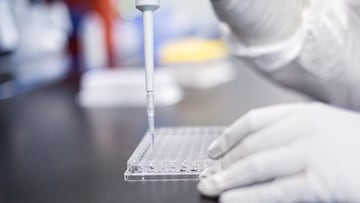Covid vaccine: Is Moderna's vaccine 95% effective and better than Pfizer's?
The Moderna vaccine reduced the risk of covid-19 infection by 94.5%. There were 95 cases of infection among patients, who received placebo in the company’s 30,000-patient study.

American biotechnology company Moderna has put pressure on other companies in a bid to develop a vaccine capable of tacking the coronavirus, having developed their own vaccine with the most positive response from testing conducted thus far.
The Moderna vaccine reduced the risk of covid-19 infection by 94.5%. There were 95 cases of infection among patients, who received placebo shots in the company’s 30,000-patient study. There were only five infections in patients who developed covid-19 after receiving Moderna’s vaccine, mRNA-1273.
Dr. Fauci pleased with results
Dr. Anthony Fauci, director of the National Institute of Allergy and Infectious Diseases, admitted the preliminary data for the Moderna and the Pfizer vaccines — the only two so far to have early estimates of vaccine efficacy — are better than he had anticipated. “I’d like to say I would have predicted it, but I would not have,” said Fauci, who has often said he would have been satisfied with covid vaccines that were 70% or 75% efficacy. Honestly, I would not have expected that. I thought that was too much to hope for,” he told STAT.
We just announced that mRNA-1273, our COVID-19 vaccine candidate, has met its primary efficacy endpoint in the first interim analysis of the Phase 3 COVE study.
— Moderna (@moderna_tx) November 16, 2020
Read more: https://t.co/vYWEy8CKCv pic.twitter.com/YuLubU1tlx
Moderna also released data about the number of patients who had severe covid-19. There were 11 cases of severe disease, all of them in the placebo group — another point of encouragement for Fauci. “There was always the concern, since the primary endpoint [of the trial] is just clinically apparent disease, how do we know it’s going to have an impact on severe disease? And the results with severe disease were striking — 11 to zero is very impressive." At the time of their data release, Pfizer and BioNTech had no severe cases in their study.
The Moderna vaccine is given in two doses, 28 days apart. The 30,000-person trial included 11,000 volunteers from communities of colour, making up 37% of the total study population. It also included more than 7,000 volunteers over the age of 65 and over 5,000 people under 65, who have high-risk medical conditions that put them at high risk of suffering from a severe infection, should they contract coronavirus.
Pfizer said last Monday that its covid-19 vaccine candidate demonstrated efficacy of more than 90%. Besides a higher demonstrated efficacy rate, Moderna's vaccine can be stored at refrigerator temperatures for up to 30 days, whereas Pfizer's vaccine needs to be stored at temperatures of -70 degrees Celsius for up to 15 days. With complex needs required for the storage of Pfizer's covid-19 vaccine, including freezer farms and dry ice suitcases, it could hinder the swift distribution of the vaccine in a way that wouldn't impact Moderna's vaccine.
No significant safety concerns
Moderna said in its press release that there were no significant safety concerns. Severe events that occurred in greater than 2% of patients included fatigue and muscle pain, which happened in nearly one patient in 10, and headache and achiness. These events were “generally short-lived."
Related stories
Moderna has a $1.525 billion contract to provide the United States with 100 million doses of the vaccine through Operation Warp Speed, the government’s fast-track program for covid-19 vaccines, therapeutics, and diagnostics.
When could vaccines be ready to deploy?
Both Moderna and Pfizer are expected to seek emergency-use authorisation from the US Food and Drug Administration if further review demonstrates their vaccines are safe. Moderna said it could seek clearance from regulators in the coming weeks. Pfizer expects to get two months of safety follow-up data in the third week in November. If all goes well, Pfizer could apply for an authorization in the US this month.

